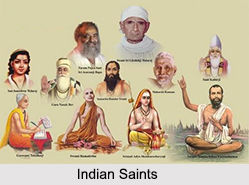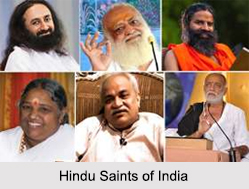 Indian Saints embody the highest ideals and are credited for demonstrating the reality of spiritual awareness. India is known to be the land of Saints and Gods. They help people to attain positive actions, devotion, spiritual practice and mental discipline by providing appropriate conditions and knowledge. It is the legacy of Indian Saints that represents the true identity of Indian ideology. Since time immemorial, India has been the seat of several religions. Numerous Indian saints took up the responsibility of popularising the postulates of various sects.
Indian Saints embody the highest ideals and are credited for demonstrating the reality of spiritual awareness. India is known to be the land of Saints and Gods. They help people to attain positive actions, devotion, spiritual practice and mental discipline by providing appropriate conditions and knowledge. It is the legacy of Indian Saints that represents the true identity of Indian ideology. Since time immemorial, India has been the seat of several religions. Numerous Indian saints took up the responsibility of popularising the postulates of various sects.
Indian Saints are considered to be the manifestations of God. They have set themselves as role models for the masses to follow. Whether it was Ramakrishna, Shankaracharya or Khwaja Muinud-din Chishti, all of them have guided their followers to achieve peace of mind through spirituality. Indian saints have adopted simple measures to explain the religious philosophies. Most of them adopted the method of narrating tales to educate the masses. Some of the Indian saints, however, propagated renunciation of the worldly affairs to achieve salvation.
Hindu Saints of India
Hindu Saints are the revered personalities associated with Hinduism in India. Over years, through their wisdom and teachings, they have reached the status of saints with a plethora of people who follow the path illuminated by them. Some of them have also gained God-like status and are considered to be reincarnations of deities. Mostly these saints are known to have renounced the world and are also recognized as swamis, rishis, sadhus and gurus. Ramakrishna Paramahansa, Swami Vivekananda, Swami Ramanand, Adi Shankara, Chaitanya Mahaprabhu, Dayananda Saraswati are some of the famous Hindu Saints of India.
 Christian Saints of India
Christian Saints of India
Christian Saints of India have been considered as religious heroes by the people belonging to the Christian community and are believed to have a special association with the sacred and mortal perfection. They have exceptional teaching abilities and have gained repute in both ancient as well as contemporary eras. Although there was no mention of saints during the time of Jesus Christ and his disciples, during 1st to 4th century the Christians started worshiping the martyrs as saints. The belief gradually gained prominence over time. Famed Christian Saints of India enlist Saint Geevarghese Mar Dionysius of Vattasseril, Parumala Thirumeni and many others.
Muslim Saints in India
The elaborations of Hazrat Mirza Ghulam Ahmad regarding the spiritual aspects of Islam have been followed by many great Sufi saints. His concepts have received further revelations through the writings of various eminent saints of Muslim community who have not only advocated the intricate concepts and terms of Tariqat but also the greatness of Hazrat Mirza. These saints have enlightened the path of innumerable followers for their spiritual progress. Khwaja Muinuddin Chishti of Ajmer, Shaikh Ahmad of Sirhind, Khawaja Habibullah Attar of Kashmir, Baba Dawud Khaki, Ali Hujwiri, Data Ganj Bakhsh, Hazrat Said Ameer of Koth are some of the prominent Muslims Saints of India.
Sikh Saints of India
Sikh Saints of India have played a crucial role in establishing the budding religion of Sikhism in the country. Their contribution towards the religion has been reckoned as immensely significant. Be it Bhai Mardana, the first disciple and lifelong companion of Guru Nanak, Baba Buddha who served under the first six Gurus or Bhai Nand Lal, a great poet and a close associate of Guru Gobind Singh; the Sikh saints have played a vital role in elucidating the spiritual concepts of Sikhism and teaching the followers the right path. Baba Deep Singh, Banda Singh Bahadur, Bhai Mani Singh and Bhai Gurdas were other prominent Sikh saints.
Besides the religion, several Indian saints have worked for social reformation. Through education, they have spread awareness and thus, helped the masses to unchain themselves from several social evils, such as untouchability, superstition, discrimination and others. Along with these, Indian saints have also been instrumental in upholding Indian culture and its glorious past.









